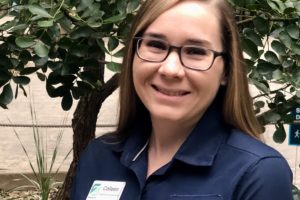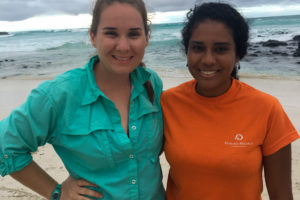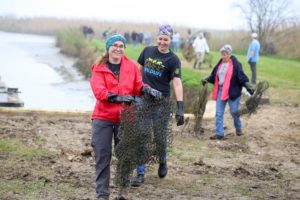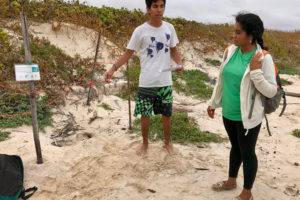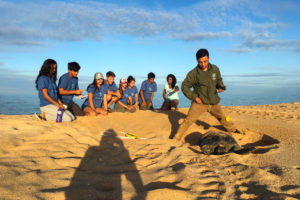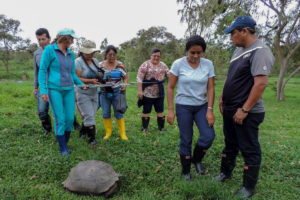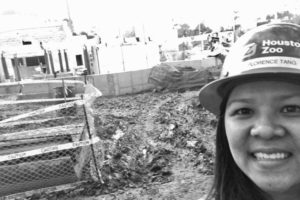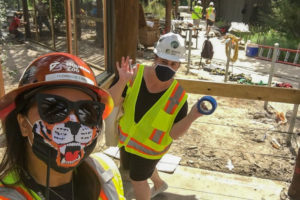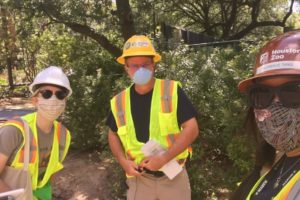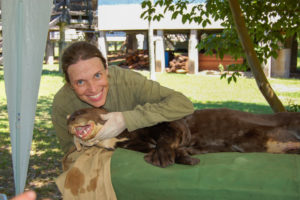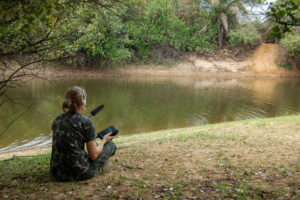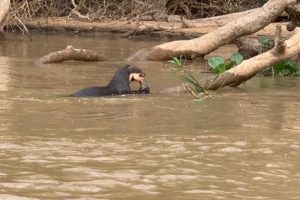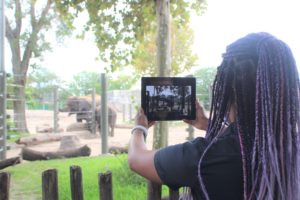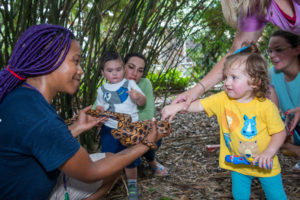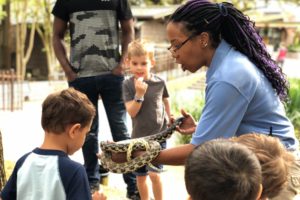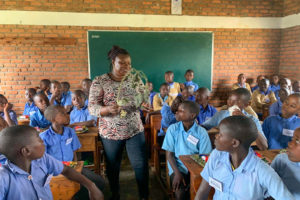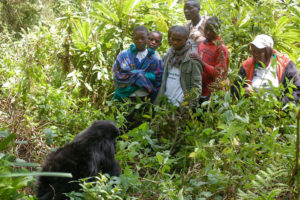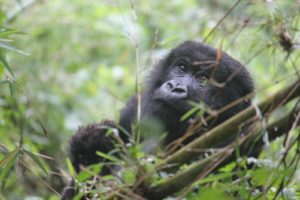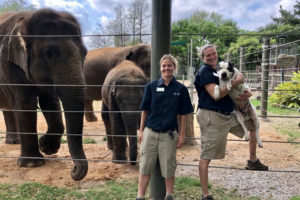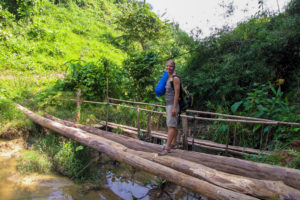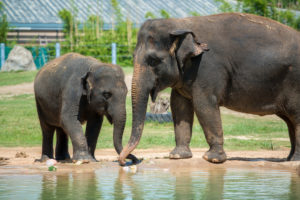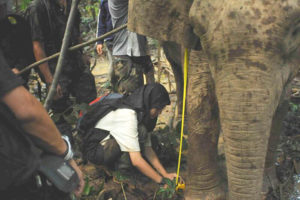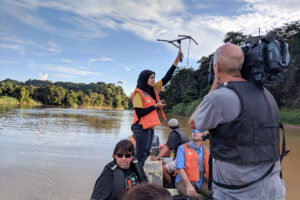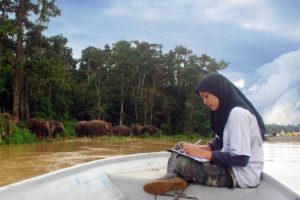Celebrating our Zoo Staff on International Women’s Day
In honor of International Women’s Day, we’re spotlighting a few of the amazing women that are part of the Zoo team locally and our wildlife-saving partner family members across the globe. This is just a snapshot of some of the incredible work that our women staff, who make up 59% of our Houston Zoo staff, do every day.
Teen Work Here and in the Galápagos Islands
Colleen Cavanaugh is the Houston Zoo’s teen programs supervisor and she facilitates our education programs for youth, ages 13-17, which includes our Zoo Crew program and Adventure Programs. Her role includes mentoring these teens to help them build leadership skills so they can become conservation leaders in their own communities. Through our Adventure Programs, she helps connect teens to nature both locally here in Texas and globally and provide them with opportunities to actively be part of conservation projects like habitat restoration or wildlife monitoring. Colleen said that conservation is important to her because protecting wildlife, their habitats, and our natural resources ultimately is protecting us as humans. We are all connected and if we want our communities of people to thrive, then we need to ensure that our communities of wildlife are thriving as well.
“My favorite part about working at the Houston Zoo is the incredible passionate team of people I get to work with. Not just the amazing educator in our Conservation Education department or the staff here at the Zoo, but our global conservation partners too. I love that I now have a network of colleagues around the world that I can learn from and collaborate with.” – Colleen
Lady Marquez is a biologist born in the Galápagos Islands. She has been the Zoo’s Galapagos conservation partner for the past eight years. While conducting sea turtle research during her masters training, Lady became very interested in a sea turtle conservation career. However, the lack of conservation focus in schools in Galápagos helped her see the need to assist Galápagos youth obtain careers in conservation. She is now a local hero for youth and is the Outreach Program Coordinator for Ecology Project International, whose aim is to promote the active participation of local youth in the conservation of the Galápagos Islands. Her conservation training program brings together passionate students, ages 15-18, with whom she meets virtually each week to provide conservation leadership training and guide and monitor conservation projects and initiatives such as sea turtle nest monitoring and protection. Lady’s goal is to protect wildlife like sea turtles that come to nest on the Galápagos Islands and ensure these passionate teens have hands-on field conservation experience as they enter college. The Houston Zoo provides training and support for Lady and her program in the Galápagos.
“Empowering women in nature conservation means trusting and supporting them. And just then we can say we are preserving earth and benefit our society.” – Lady
Seeing South America’s Pantanal Here and in Brazil
Florence Tang is a project manager in the Design and Engineering department at the Houston Zoo. She’s been at the Zoo for two and a half years and said it’s been thrilling to be a part of the new exhibits and design/construction projects at the Zoo. Florence said it was an experience of a lifetime to have worked on the South America’s Pantanal project, which features 11 new animal habitats along the immersive trail.
Florence believes that it’s so important to build a legacy for the next generation and for our footprint to be light in the landscape. She has a deep reverence for the resilience and power of nature’s metronome. To be able to collaborate with and amplify the field work of our partners in Brazil adds a deeper layer of meaning to why we built this immersive exhibit. The complexities of this exhibit – from the mudbank planters to the underwater pools and slides in combination with the double-sided fish tank and otter den with a climbing rock – allow for so many levels of engagement and enjoyment. She always discovers something new each time she walks through because the Zoo has a living and dynamic collection.
“I very much appreciate that we are mission-oriented. I especially value working with colleagues who are so talented and humble at what they do. We are our own little microcosm, but also part of such major issues in the world. Every day is an adventure. It’s never a dull moment. The Reflection Pool promenade lined with oak trees is one of my favorite spaces in the world.” – Florence
Caroline Leuchtenberger was born and raised in Brazil and is the coordinator of the Giant Otter Project, and professor at the Federal Farroupilha Institute in Brazil. She has been a Zoo conservation partner for the past three years. Since 2006, she has been working with local communities in the Pantanal and other areas of Brazil to conduct giant otter and jaguar research and conservation. Caroline is very passionate about finding peaceful solutions for people who live around giant otters and jaguars. She is also the species coordinator of the Otter IUCN Species Specialist Group and assists with the development of the National Action Plan for the Conservation of Giant Otters coordinated by the Brazilian Environmental Agency (ICMBio) and the giant otter reintroduction program.
“As a conservationist, seeing women leading important conservation actions around the world empowers me to follow my purpose and believe in a better future for the Earth.” – Caroline
Early Childhood Education Here and in Rwanda
Leia Cook is our early childhood programs coordinator in the Conservation Education department. She has worked at the Zoo for nearly six years and her main role is to help facilitate the Zoo’s Early Childhood programs, including Zoo Sprouts! Working with this program has allowed her opportunities to introduce young children, ages 18 months to 5 years) and their adults to engaging, interactive, fun, and safe first experiences with Zoo animals, green spaces, and wildlife. She also helps coordinate the in-person Animal Encounters and Virtual Animal Experiences programs. Both of these programs allow for guests to get an up-close and personal sneak peek into our animal worlds while having a chance to meet the keepers who help care for the animals.
Leia said conservation is important to her because if we do not learn to coexist sustainably within our green spaces and with our wildlife then we may one day lose them and all the benefits they provide to the environment and also to us. Conservation is built into the Zoo’s early childhood programming by focusing on the child simply gaining a love and appreciation for wildlife and green spaces first while simultaneously giving their adult concrete ways they can help save animal in the wild. The Zoo’s goal is to get children to fall in love with their favorite animal or green space and as they grown and become more connected to it, the more likely they are to want to save it.
“My favorite part of working at the Houston Zoo is the memorable moments we get to create with our guests. It’s a lot of fun to over hear a discussion a guest is having and then to share a relatable fun story or provide them with more in depth knowledge on the subject.” – Leia
Valerie “Val” Akuredusenge was born and raised in Rwanda and is now the program director for Conservation Heritage-Turambe, a Rwandan-based program that educates local youth living near wild gorillas about their importance and helps protect them in the wild. Val has been the Zoo’s gorilla conservation partner for eight years. She teaches local Rwandan school children and community members living close to gorillas about conservation and health to ensure they live in harmony with gorillas and their habitat. She is creating the next generation of Rwanda’s wildlife conservationists by encouraging, engaging, and inspiring schoolchildren to care about their natural resources, and act on behalf of wildlife. The Houston Zoo provides training and support for Val and her education program.
“Women are the best influencers within the society. We play a very important role in the global movement of conservation.” – Val
Asian Elephants Here and in Borneo
Kim Klein has been a zookeeper at the Zoo since 2007, working with our Asian elephant herd. Conservation has become increasingly important to Kim over the years. Elephants are fantastic animals and each individual has unique personalities. She enjoys spending her work days with them, caring for them, and watching the little ones grow up over the years — it’s an amazing experience. She likes to encourage and remind guests that by being good stewards to the environment they are helping to save animals in the wild. Whether it’s recycling, being more minimal and buying less products in general, like single-use plastics, it’s important to be a conscious consumer and make smart purchases that don’t harm forests and the natural environment.
Working with elephants at the Zoo has inspired Kim to help elephants in the wild. Through the Zoo’s Staff Conservation Fund, Kim was able to travel to Laos in 2015 and again in September 2019 and help support conservation efforts at the Elephant Conservation Center in Laos. Part of her work included building enrichment toys to help those elephants strengthen their social bonds, and ultimately five elephants were released into a protected forest in 2019.
“My favorite part of work is many things. I enjoy the elephants and watching them socialize. I like providing them with fun enrichment, but I also like to keep up with the work Farina is doing in Borneo as well as other conservation projects.” – Kim
Dr. Nurzhafarina “Farina” Othman was born and raised in Borneo and has committed her life to protecting Bornean elephants. Farina has been the Zoo’s elephant conservation partner for 10 years and is studying wild elephants’ moving patterns. Elephants require large amounts of land to live, and when that land is turned into farms or plantations, the elephants sometimes move through the crops to get to more habitat. Land use and development are extremely important in this region and Farina’s study is helping local communities and government agencies reduce the conflict surrounding elephants needing to cut through local crops and plantations to get back to the river.
Farina has an incredibly effective, peaceful approach to conservation and has successfully invited every stakeholder that lives around Bornean elephants (even palm oil plantation owners) into the planning to protect them. This remarkable leader is also inspiring and mentoring many other young women scientists in her country to pursue wildlife conservation careers. The Houston Zoo provides training and support for Farina and her elephant protection work.
“I think women in conservation have a lot of courage to turn self-doubt into something more positive and we do it with passion.” – Farina
Disclaimer: All photos were taken before the COVID-19 pandemic.
